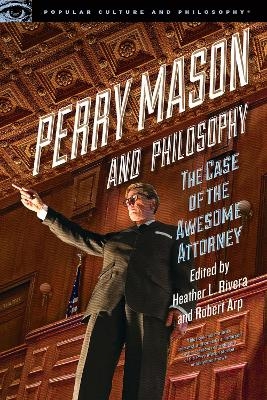
Perry Mason and Philosophy
Open Court Publishing Co ,U.S. (Verlag)
978-0-8126-9907-4 (ISBN)
In 1933 the crime writer Erle Stanley Gardner, himself a practicing lawyer, unleashed the character Perry Mason in the novel The Case of the Velvet Claws. Perry Mason entered into public consciousness as a new conception of the role of the defense lawyer, so that millions of Americans came to expect every criminal trial to have its “Perry Mason moment.”
In the 1950s the Perry Mason TV show had a phenomenal success, and Mason came to be identified with Raymond Burr. Now Perry Mason has again been restored to life in the HBO series starring Matthew Rhys and John Lithgow. Meanwhile, the eighty-two original Erle Stanley Gardner novels continue to sell thousands of copies each week.
Perry Mason gave America a new conception of the trial lawyer, as someone who was always loyal to his client and always prepared to use dirty tricks such as misdirection and withholding of evidence to protect the innocent and secure the ends of Justice. The Mason of the novels is less scrupulous than the Raymond Burr Mason, and would sometimes be in danger of going to jail if the trial didn’t turn out right—which it always did, largely because of Mason’s cleverness.
The Perry Mason icon raises many philosophical issues explored by seventeen different philosophers in this book, including:
● Can we defend Paul Drake’s claim (The Case of the Blonde Bonanza) that Mason is “a paragon of righteous virtue” despite his predilection for skating on thin legal ice?
● Can complex murder cases be solved by facts alone—or do we also need empathy?
● The most convincing way to give a TV episode a surprise ending is by the guilty person suddenly confessing. But in reality, is a confession necessarily so convincing?
● Does Perry Mason represent the Messiah?
● How does the Raymond Burr Perry Mason compare with the more recent TV character Saul Goodman (Breaking Bad and Better Call Saul)?
● Is it morally okay to mislead the police if this helps your client and your client is innocent?
● How does Perry Mason help us understand the distinction between natural law and positive law?
● Do the Perry Mason stories comply with Aristotle’s recipe for a good work of fiction?
● Does life imitate art, when Perry Mason is cited in real-life courtroom arguments?
● How much trickery can be justified by loyalty to one’s client?
● Can evidence in murder trials be evaluated by probability theory?
● Perry Mason is officially a lawyer and unofficially a detective. But isn’t he really a historian and a psychgoanalayst?
● Della Street is a competent legal secretary, but is she something more?
● Mason often says that “Eye-witness testimony is the worst kind of evidence” and occasionally that “Circumstantial evidence is the best evidence we have.” Can these claims be defended?
Heather L. Rivera teaches history at Louisiana State University Shreveport and is an independent philosophical writer who has interests in metaphysics, the Problem of Evil, and philosophy of mind. She is co-editor (with Alexander E. Hooke) of The Twilight Zone and Philosophy (Open Court, 2019). She has written numerous philosophy articles and guest lectured at Suffolk County Community College on such topics as "Cindy Sherman's Film Stills," "Simulacra and Simulation by Jean Baudrillard," and "Inception relating to Rene Descartes's Meditation on First Philosophy." She has given lectures annually on Evil, Pop Culture, and Philosophy at the Long Island Philosophical Society Conferences. Robert Arp has written and edited innumerable philosophy books, both scholarly and popular, including Hamilton and Philosophy: Revolutionary Thinking (2017), 1001 Ideas that Changed the Way We Think (2013), andScenario Visualization: An Evolutionary Account of Creative Problem Solving (2008).
| Erscheinungsdatum | 10.05.2021 |
|---|---|
| Reihe/Serie | Popular Culture and Philosophy |
| Zusatzinfo | Illustrations |
| Verlagsort | Chicago, IL |
| Sprache | englisch |
| Maße | 152 x 228 mm |
| Themenwelt | Kunst / Musik / Theater ► Film / TV |
| Geisteswissenschaften ► Philosophie ► Geschichte der Philosophie | |
| Geisteswissenschaften ► Philosophie ► Philosophie der Neuzeit | |
| Geisteswissenschaften ► Sprach- / Literaturwissenschaft ► Anglistik / Amerikanistik | |
| Geisteswissenschaften ► Sprach- / Literaturwissenschaft ► Literaturwissenschaft | |
| ISBN-10 | 0-8126-9907-6 / 0812699076 |
| ISBN-13 | 978-0-8126-9907-4 / 9780812699074 |
| Zustand | Neuware |
| Haben Sie eine Frage zum Produkt? |
aus dem Bereich


